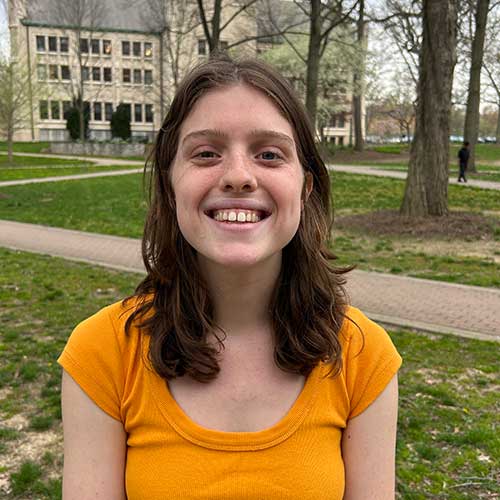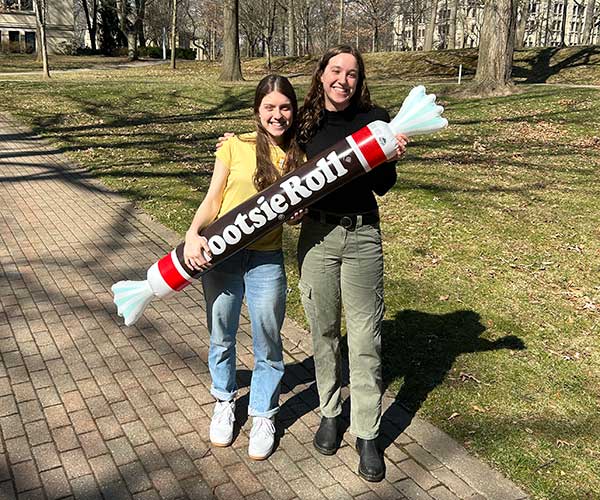
Anthropology and history major studies effects of incarceration on inmates’ grief

As an anthropology and history major at The College of Wooster, Anna Walsh ’24, became interested in how inmates experience grief while they are incarcerated. For her Independent Study, Walsh researched “How does incarceration inhibit healthy grief?” and “In what ways are incarcerated people supported after the death of a loved one, if at all?”
Overcrowded prisons, lack of resources, violence, and a lack of healthcare contributed to “really awful” prison conditions, Walsh said. With a goal to contextualize grief in prison, she studied the history of grief in the United States including how death has become an increasingly taboo topic to discuss in the country. The history of American prisons and the prison’s rights movement also informed her research.
“Because I’d chosen a topic which mattered so much to me, I felt more interested and driven than ever before, and now I know I can enjoy this kind of work.”
—Anna Walsh ’24
Through interviews with two individuals who work for hospice behind bars and a close family friend who was incarcerated for eight years, Walsh learned the support for grieving people is severely limited in the prison setting. The lack of support often leaves inmates unable to grieve in a healthy way. Instead, their “disenfranchised grief” often leads to higher rates of depression, anxiety, and physical repercussions such as insomnia. Walsh also learned incarcerated individuals often feel guilt that they were still incarcerated when their loved one(s) died and they were not able to comfort other loved ones.
Q: What excites you about your I.S.?
Walsh: I don’t think the topic I chose gets enough attention. Everyone I interviewed brought this up as well—we don’t often consider the implications of grief in prison, but so many people experience mourning behind bars. It’s an extremely important subject, but it feels hidden, so I am glad my paper focused on it.
Q: How did Wooster prepare you for your I.S.?
Walsh: My classes prior to I.S. prepared me to write. Writing is still challenging, but I had no idea how to structure an essay before getting here. I also didn’t know how to find sources and conduct research. Now I’m familiar with both and feel like I can produce much better work.
Q: In what ways has your relationship with your I.S. mentor supported you throughout this process?

Walsh, like many seniors, celebrated turning in her I.S. by taking a celebratory photo with a giant Tootsie Roll.
Walsh: Both my advisors gave tons of useful feedback and checked in with me regularly. I always felt like they were invested in my project and wanted the final paper to reach its full potential.
Q: What did you learn from your I.S.?
Walsh: The I.S. shaped my relationship with academics. Prior to this project, I’d never been so invested in an assignment, and I often found research and writing tedious. Because I’d chosen a topic which mattered so much to me, I felt more interested and driven than ever before, and now I know I can enjoy this kind of work.
Posted in Independent Study on June 11, 2024.
Related Posts
Related Areas of Study
History
Critically examine events and societies of the past and learn to tell the stories future generations need to know
Major MinorAnthropology
Use problem-solving and research skills to explore and understand communities and cultures in every part of the world.
Major Minor

